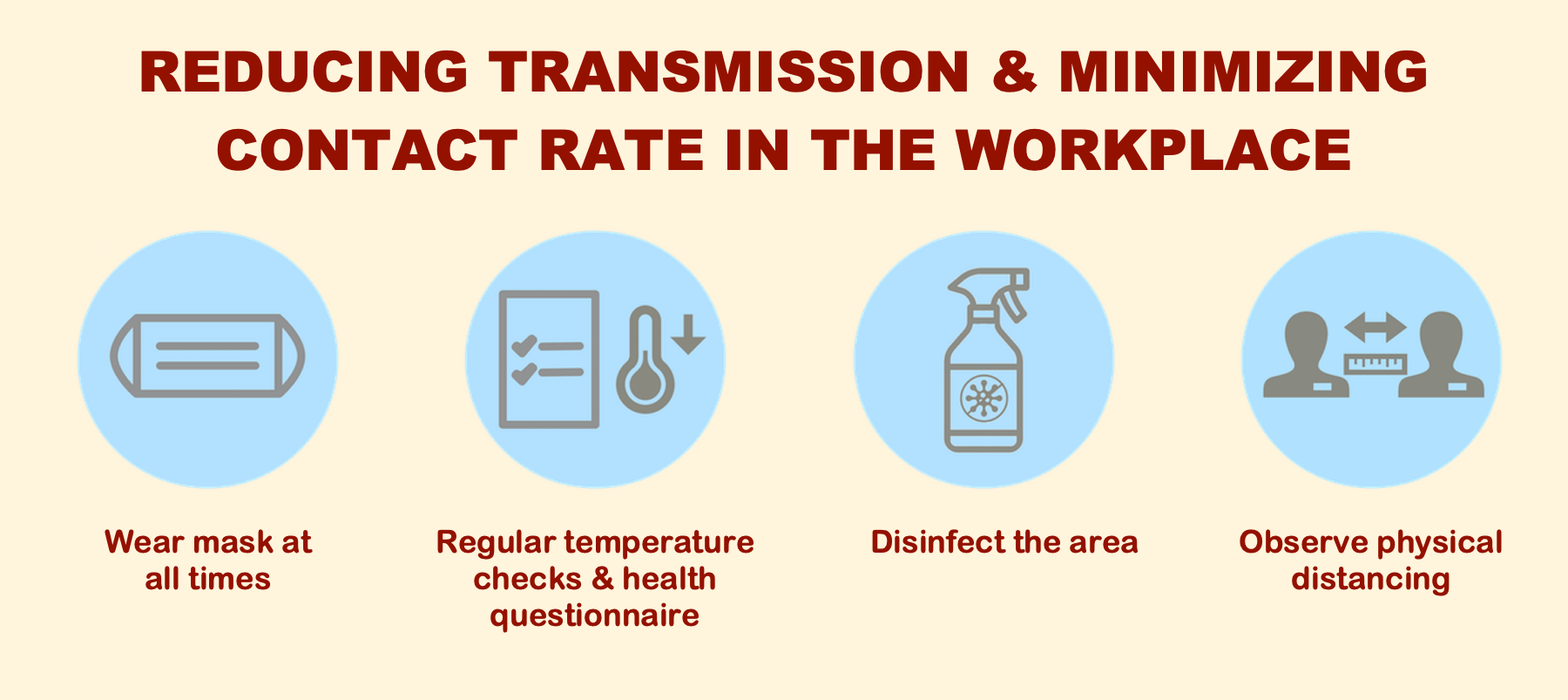Consult us today!
Send your inquiries and we'll get in touch with you as soon as possible.
The Department of Trade and Industry (DTI), together with the Department of Labor and Employment (DOLE), issued the Interim Guidelines on Workplace Prevention and Control of COVID-19 (Interim Guidelines) dated 30 April 2020 to assist private institutions in developing minimum health protocols and standards in light of the COOVID-19 pandemic during the Enhanced Community Quarantine (ECQ) and General Community Quarantine (GCQ).
In the Interim Guidelines, the DOLE and DTI mandated safety and health standards to be implemented in all workplaces to reduce transmission of COVID-19.
INCREASE PHYSICAL AND MENTAL RESILIENCE
First, all employers and workers are advised to increase physical and mental resilience. Employers shall emphasize to all workers to maintain good health by eating nutritious and well-cooked food, drinking plenty of fluids and avoiding alcoholic beverages, increasing the body’s resistance by having adequate rest and at least eight (8) hours of sleep, and exercising regularly.
REDUCING TRANSMISSION AND MINIMIZING CONTACT RATE
Next, it must be ensured that the following are implemented to reduce transmission and minimize contact rate:

In case a person’s recorded temperature is greater than 37.5C even after a five (5)-minute rest, or if his/her response in the HSQ needs further evaluation by the clinic staff, the person must be isolated in a designated area, well ventilated and frequently disinfected, and he/she must be disallowed to enter the premises of the workplace. The clinical staff who will assess those in the isolation area must be provided with the appropriate medical grade PPEs by the establishment.
Likewise, any equipment and/or vehicle entering the hub operational area must go through a disinfection process. All work areas and frequently handled objects, such as doorknobs and handles, must be cleaned and disinfected at least once every two (2) hours. Also, tables and chairs shall be disinfected before and after every use of the area, as well as at the end of the work day. Canteens and kitchens must likewise be cleaned and disinfected regularly.
The number of people inside an enclosed space must be limited, and as such, the use of stairs in encouraged subject to physical distancing.
Further, eating in communal areas is discouraged and it is best to eat in individual work areas, if possible. If not, employers shall ensure that physical distancing is maintained in dining areas with one (1) worker per table and one (1) meter distance per worker.
Effecting alternative work arrangements (e.g. working-hour shift, work from home) where feasible, is highly encouraged. Prolonged face-to-face interaction are discouraged, and meetings needing physical presence must be kept to a minimum number of participants and with short duration. Videoconferencing shall be utilized for lengthy discussions.
IN CASE OF AN ILL CO-WORKER
In the event that a worker is suspected as having COVID-19, said worker shall immediately proceed to the isolation area and advised never to remove his/her face mask. He/she shall be attended by clinical personnel who must wear appropriate PPEs, and should require the transport of the affected worker to the nearest hospital, if needed. Moreover, the workplace must be decontaminated with appropriate disinfectant (chlorine bleaching solution and 1:100 phenol-based disinfectant) and after decontamination, work may resume after 24 hours. Workers present in the work area with the affected worker shall go on a 14-day home quarantine and undergo monitoring for symptoms.
However, if a worker is sick or has a fever but is not suspected to have COVID-19, the employer must advise the worker to take prudent measures to limit the spread of communicable diseases by staying at home and avoiding work/crowds, taking adequate rest and plenty of fluids, practice personal hygiene, and seek appropriate medical care, if needed.
DUTIES OF EMPLOYERS AND WORKERS
Employers are directed to:
Workers are directed to:
OTHER GUIDELINES
Employers may test workers for COVID-19, with testing kits provided by the employer. Workers with negative test shall continue to work and employers must continue to monitor all workers.
Employers are also highly encouraged to allow “most at risk workers” (workers aged 60 years old and above, or of any age with co-morbidities or pre-existing illness, immunocompromised health status, or with high risk pregnancy) and vulnerable groups to do work from home arrangement, without diminution in wages or benefits.
Lastly, employers shall provide the DOLE through its Regional Office copy furnished the DOH, monthly reporting of illness, diseases, and injuries utilizing the DOLE Work Accident/Illness Report Form.
by: Emem Flores